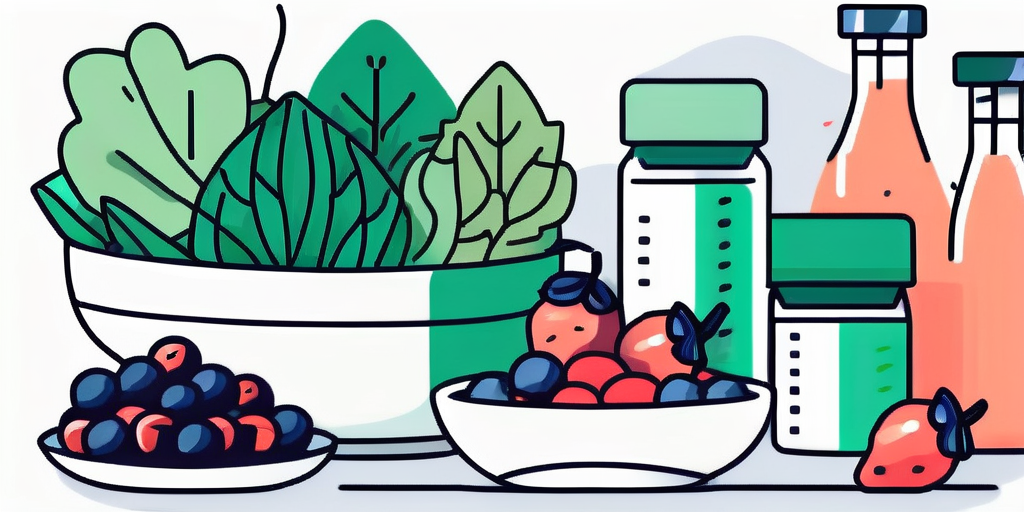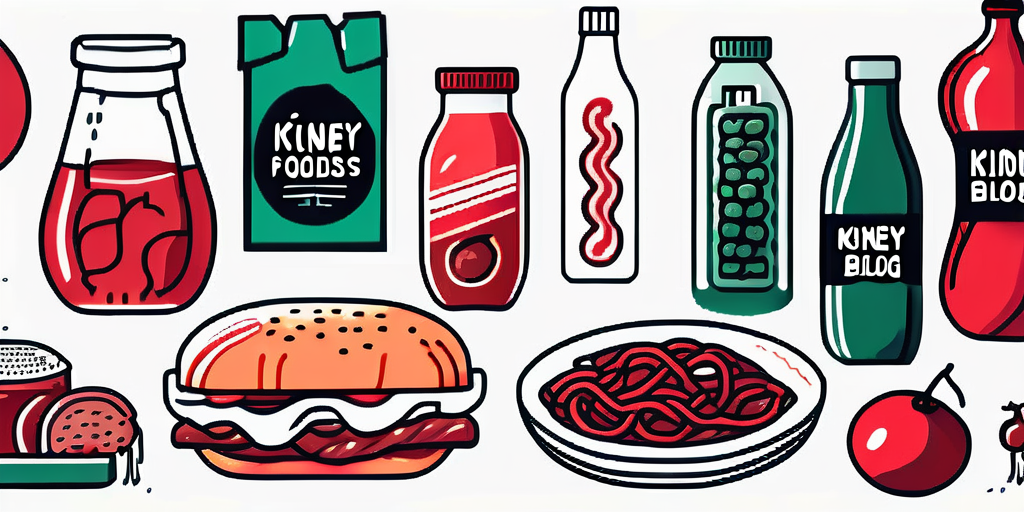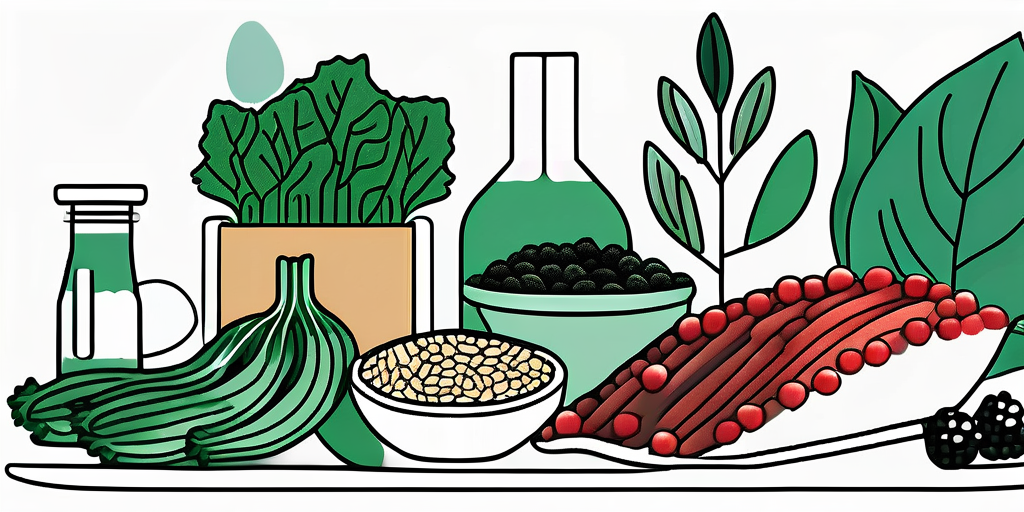Your kidneys play a vital role in maintaining your overall health. These bean-shaped organs filter waste and toxins from your blood, regulate fluid balance, and produce hormones that help control blood pressure. Taking care of your kidneys is essential to ensure their optimal function and prevent kidney problems. One way you can support kidney health is through your diet. By incorporating foods that are good for your kidneys, you can naturally boost renal health. In this article, we will explore the connection between diet and kidney health, as well as provide a comprehensive list of kidney-friendly foods to include in your daily meals.
Understanding the Role of Kidneys in Your Health
Before we dive into the specifics of kidney-friendly foods, it's important to understand the vital role your kidneys play in maintaining your overall health. The kidneys are responsible for filtering waste products, excess fluids, and toxins from your blood, which are then eliminated through urine. Additionally, they help regulate the body's electrolyte balance, pH levels, and blood pressure. Without properly functioning kidneys, waste and toxins can build up in your body, leading to various health problems.
Let's take a closer look at the incredible functions performed by your kidneys:
- Filtering waste products: The kidneys filter waste products, such as urea and creatinine, from the blood. These waste products are byproducts of various metabolic processes in the body. By removing them, the kidneys ensure that your blood remains clean and free from harmful substances.
- Regulating fluid balance: By adjusting the amount of water excreted as urine, the kidneys help maintain fluid balance in the body. This balance is crucial for proper hydration and overall bodily functions. When you drink more fluids, the kidneys produce more urine to eliminate the excess. Conversely, when you are dehydrated, the kidneys conserve water by producing less urine.
- Controlling electrolyte levels: The kidneys play a vital role in regulating the levels of electrolytes, such as sodium, potassium, and calcium, in your blood. These electrolytes are essential for various bodily functions, including nerve signaling, muscle contractions, and maintaining pH balance. The kidneys ensure that these electrolytes are kept within a narrow range to support optimal physiological processes.
- Producing hormones: In addition to their filtration and regulation functions, the kidneys also produce hormones that have important roles in the body. One such hormone is erythropoietin, which stimulates the production of red blood cells in the bone marrow. Another hormone, renin, helps regulate blood pressure by constricting blood vessels and influencing fluid balance. Lastly, the kidneys produce an active form of vitamin D, which is crucial for maintaining bone health and calcium balance.
Now that we have a better understanding of the functions performed by the kidneys, let's explore some common kidney problems and their causes:
- Diabetes: High blood sugar levels can damage the blood vessels in the kidneys, affecting their function. Over time, this can lead to a condition called diabetic nephropathy, which is a leading cause of kidney failure.
- High blood pressure: Increased pressure on the blood vessels can damage the kidneys over time. Hypertension, or high blood pressure, can cause the blood vessels in the kidneys to narrow and weaken, impairing their ability to filter waste products effectively.
- Urinary tract infections: Infections that affect the urinary tract can spread to the kidneys, causing inflammation and damage. This is known as pyelonephritis and can lead to kidney scarring and impaired kidney function if left untreated.
- Kidney stones: These are hard deposits that form in the kidneys and can cause severe pain and blockages. Kidney stones are typically composed of calcium, oxalate, or uric acid crystals. Factors such as dehydration, certain dietary habits, and genetic predisposition can contribute to their formation.
- Genetic conditions: Some individuals may be born with genetic conditions that affect kidney function. Examples include polycystic kidney disease, a condition characterized by the growth of fluid-filled cysts in the kidneys, and Alport syndrome, a genetic disorder that affects the structure and function of kidney tissues.
The Connection Between Diet and Kidney Health
Your diet plays a crucial role in maintaining kidney health. The foods you consume can either support or strain your kidneys. By making mindful choices and incorporating kidney-friendly foods into your diet, you can support optimal renal function and reduce the risk of developing kidney problems.
When it comes to kidney health, it's important to understand how food affects your kidneys. Certain foods can have a significant impact on the health and function of your kidneys. Let's take a closer look at some of these foods:
- Sodium: Consuming excessive amounts of sodium can increase blood pressure and strain the kidneys, as they play a role in regulating sodium levels. It's important to be mindful of your sodium intake and opt for low-sodium alternatives whenever possible.
- Protein: While protein is essential for overall health, consuming excessive amounts can put a strain on the kidneys' filtration process. It's important to strike a balance and consume an appropriate amount of protein based on your individual needs.
- Fluid intake: Staying properly hydrated is crucial for kidney health, as it helps maintain optimal blood flow and supports the kidneys' ability to filter waste. Drinking an adequate amount of water throughout the day can help keep your kidneys functioning optimally.
Now that we understand how certain foods can affect our kidneys, let's explore the nutrients that are essential for kidney health. These nutrients can help support the function of your kidneys and promote overall renal health:
- Potassium: Adequate potassium intake can help regulate blood pressure and prevent the formation of kidney stones. Foods rich in potassium include bananas, oranges, spinach, and sweet potatoes.
- Vitamin C: This antioxidant vitamin can help reduce the risk of urinary tract infections and promote kidney health. Citrus fruits, strawberries, and bell peppers are excellent sources of vitamin C.
- Fiber: Consuming a diet rich in fiber can support healthy digestion and help prevent conditions like constipation, which can put strain on the kidneys. Whole grains, legumes, and fruits and vegetables are all great sources of dietary fiber.
By incorporating these kidney-friendly foods into your diet and being mindful of your overall nutrition, you can take proactive steps towards maintaining optimal kidney health. Remember to consult with a healthcare professional or registered dietitian for personalized dietary recommendations based on your specific needs and health goals.
Foods That Promote Kidney Health
Now that we have explored the connection between diet and kidney health, let's dive into the specific foods that can naturally boost renal health.

When it comes to supporting kidney health, incorporating a variety of fruits and vegetables into your diet is key. Fruits and vegetables are excellent choices due to their high nutrient content and low sodium levels. They are not only delicious but also provide numerous benefits for your kidneys. Some kidney-friendly fruits and vegetables include:
- Apples: Apples are packed with fiber and antioxidants, which can help reduce inflammation and protect against kidney damage.
- Blueberries: Blueberries are rich in antioxidants and have been shown to improve kidney function and reduce the risk of kidney stones.
- Pineapple: Pineapple contains bromelain, an enzyme that has anti-inflammatory properties and may help reduce the risk of kidney inflammation.
- Spinach: Spinach is a nutrient powerhouse, loaded with vitamins, minerals, and antioxidants that promote kidney health and protect against oxidative stress.
- Kale: Kale is another leafy green that is beneficial for the kidneys. It is high in vitamins A, C, and K, as well as minerals like potassium, which can help regulate blood pressure.
- Broccoli: Broccoli is a cruciferous vegetable that is rich in fiber and antioxidants. It also contains compounds that support detoxification processes in the kidneys.
By incorporating these fruits and vegetables into your diet, you can provide your kidneys with essential nutrients, antioxidants, and fiber, which promote kidney health and reduce the risk of kidney problems.
While excessive protein intake can strain the kidneys, consuming moderate amounts of high-quality protein is important for maintaining muscle mass and overall health. When it comes to kidney-friendly protein sources, there are several options to choose from:
- Lean poultry: Chicken and turkey breast are lean sources of protein that are lower in phosphorus, making them suitable for individuals with kidney problems.
- Fish: Fatty fish like salmon, mackerel, and sardines are not only excellent sources of protein but also provide omega-3 fatty acids, which have anti-inflammatory properties and may help protect against kidney disease.
- Eggs: Eggs are a versatile protein source that can be enjoyed in various ways. They are also low in phosphorus and a good source of essential amino acids.
- Quinoa: Quinoa is a plant-based protein source that is rich in fiber, vitamins, and minerals. It is also lower in phosphorus compared to other grains, making it a kidney-friendly choice.
By including these protein sources in your diet, you can ensure that you are getting adequate protein while also considering the needs of your kidneys.
Proper hydration is crucial for supporting kidney health. Including hydrating foods and drinks in your diet can help maintain optimal fluid balance and support the kidneys' functions. Some hydrating options that are beneficial for renal health include:
- Watermelon: Watermelon is not only refreshing but also has a high water content, which can contribute to your daily fluid intake. It is also a good source of vitamins A and C.
- Cucumber: Cucumbers are made up of approximately 95% water, making them an excellent choice for hydration. They are also low in calories and provide small amounts of vitamins and minerals.
- Herbal teas: Herbal teas, such as chamomile, mint, and hibiscus, are hydrating alternatives to sugary beverages. They can be enjoyed hot or cold and provide various health benefits.
- Coconut water: Coconut water is a natural, electrolyte-rich beverage that can help replenish fluids and provide essential minerals like potassium and magnesium.
These hydrating foods and drinks not only contribute to your daily fluid intake but also provide additional nutrients that are beneficial for kidney health.
Foods to Avoid for Kidney Health
In addition to incorporating kidney-friendly foods, it's equally essential to avoid foods that can strain your kidneys and contribute to kidney problems.

High Sodium Foods and Kidney Health
High sodium intake can lead to increased blood pressure and put a strain on the kidneys' ability to regulate fluid balance. To support kidney health, it's important to limit the consumption of high sodium foods, such as:
- Processed meats
- Canned soups
- Fast food
- Salted snacks
Opting for low sodium alternatives and cooking fresh meals at home with minimal added salt can help protect your kidneys.
The Impact of Processed Foods on Kidneys
Processed foods often contain additives, preservatives, and high levels of sodium, which can strain the kidneys. Minimizing the consumption of processed foods, such as packaged snacks, frozen meals, and sugary drinks, can contribute to better kidney health.
Incorporating Kidney-Friendly Foods into Your Diet
Now that you are familiar with the foods that promote kidney health and those to avoid, it's time to incorporate kidney-friendly foods into your daily meals.

Meal Planning for Kidney Health
When planning your meals, consider incorporating a variety of kidney-friendly foods. Here's an example of a kidney-friendly meal plan:
- Breakfast: Start your day with a bowl of oatmeal topped with blueberries for antioxidants and a side of scrambled eggs for a moderate protein source.
- Lunch: Enjoy a colorful salad with spinach, kale, cucumber, and grilled chicken for nutrients and a healthy dose of protein.
- Afternoon Snack: Have a refreshing snack of sliced watermelon or cucumber with a glass of herbal tea.
- Dinner: Prepare a grilled fish fillet served with quinoa and steamed broccoli for a balanced meal with high-quality protein and essential nutrients.
- Evening Snack: Opt for a handful of almonds for a satisfying and kidney-friendly snack.
Remember to drink plenty of water throughout the day to stay well-hydrated.
Quick and Easy Kidney-Friendly Recipes
If you're looking for simple and delicious kidney-friendly recipes, here are a few ideas:
- Quinoa Salad: Toss cooked quinoa with diced cucumbers, cherry tomatoes, and chopped parsley. Drizzle with a lemon and olive oil dressing for a refreshing and nutrient-packed salad.
- Grilled Chicken with Roasted Vegetables: Marinate chicken breasts in a mixture of lemon juice, garlic, and herbs. Grill them to perfection and serve with roasted asparagus and bell peppers.
- Watermelon Smoothie: Blend fresh watermelon with a squeeze of lime juice and a handful of mint leaves for a hydrating and kidney-friendly smoothie.
These recipes are just a starting point, and you can get creative with your own variations using kidney-friendly ingredients.
By understanding the role of your kidneys, making smart food choices, and incorporating kidney-friendly foods into your diet, you can naturally boost renal health. Remember to consult with a healthcare professional or registered dietitian for personalized dietary advice, especially if you have existing kidney problems or medical conditions. Take care of your kidneys, and they will take care of you!




